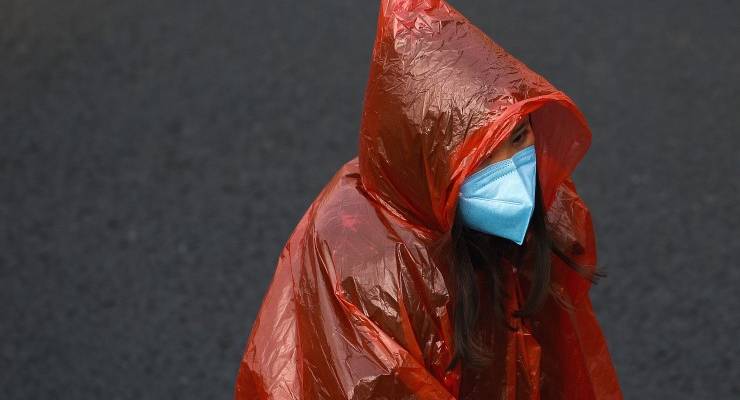
The COVID-19 epidemic is eliciting immense global sympathy and concern — sympathy for those afflicted in Wuhan and for the hospital staff trying to help them; and concern over the origins, containment and spread of the disease beyond China.
In China it has also prompted outrage over local authorities’ initial responses to the threat. Some of that outrage is reflected in international commentary on the challenges the epidemic presents for Xi Jinping and authoritarian party rule.
Given China’s opaque political system we are unlikely to learn about challenges to Xi’s leadership until they happen. What we do know is that the epidemic presents challenges for a top-down system of government that shows little flexibility in meeting the needs of an economy in transition and a society with growing expectations.
One sign of this inflexibility is the six- or seven-week delay between the earliest recorded cases and public acknowledgement of human-to-human infection on January 20. The delay proved costly in lives and credibility.
Another is the prohibition placed on private citizens sharing information about the disease on social media. Only officials are allowed to talk publicly about it.
When it comes to system inflexibility, China’s officials face challenges extending well beyond the current COVID-19 crisis. The country’s long-anticipated shift to a consumer and services economy calls for a parallel shift from a development state to a service-oriented style of government, founded on what might loosely be called a public service ethos.
What this means in practice is likely to vary from one country to another but common to all is a commitment to serving a community honestly and impartially and to being accountable to the communities they serve.
This does not describe Xi Jinping’s China.
To be sure, at its 19th party congress in October 2017 the party leadership identified the key domestic problem (“principal contradiction” in party-speak) as “the contradiction between unbalanced and inadequate development and the people’s ever-growing needs for a better life”.
The congress drafted an agenda to service people’s needs, ranging from material and cultural development to democracy, rule of law, fairness, security and a better environment.
That appears to be easier said than done.
China’s impressive achievements as a development state offer little guidance for transforming an old-style Leninist cadre system into a bureaucracy with a public service ethos.
For a start, the country’s command-style cadre system operates over five formal territorial levels (central, provincial, prefectural/city, county/district, township) all of which sit above the “grassroots” community level of villages and neighbourhoods, the places where people actually live and work.
None of the formal five levels is accountable to ordinary citizens. The cadres operating on each level are accountable only to their superiors, and that through upward reporting procedures and down-flowing approvals and instructions.
On critical or sensitive issues, lower-level officials have to await higher instructions before taking appropriate action.
What this means in the event of humanitarian crises or natural disasters is that the central government can lock down any and all institutions across all five levels of government whenever it pleases in an effort to contain the problem.
For the same reason, though, it can fail to recognise and acknowledge a problem as quickly as it should and it can have trouble getting help to where it’s needed most.
Take the Red Cross Society of China, for example, an organisation under central party management and control. Central instructions and contributions through the Red Cross have to pass through all five administrative levels before they get to people on the ground.
Not much is left of government or donor contributions at that point. Even accompanying donor instructions are likely to be garbled or ignored.
When the central government tasks a national charity with channelling public funds or private donations towards disaster relief or poverty alleviation, funds are typically passed from donors or ministries through the central office of the charity, from there to the relevant provincial office, then to prefectural or city offices and on to county or district offices in the affected regions.
Not one of the four formal levels below the centre has contact with the target communities in need, which fall under the community level of residential settlements.
Even so, each of the four levels can take a substantial management fee for its own operating expenses from the funds filtered through its offices with the result that less than two thirds of initial funds could end up being available for distribution at the local level.
That’s not all. The local community level is itself organised as a hierarchy of towns and administrative villages, each of which can take its own percentage cut, or possibly profit improperly through procurement of whatever relief aids are required from preferred suppliers, before donations or supplies get to people living in hamlets and neighbourhoods.
So by the time they reach affected communities, party-run charity organisations end up delivering less than half of the resources earmarked for relief of the communities targeted for assistance.
Private donors can sometimes circumvent this kind of rent-seeking behaviour by contributing directly to a local city Red Cross agency. In this case, however, the city Red Cross agency is more likely to follow local government priorities than donor intentions.
The Wuhan Red Cross, according to New York Times reports, favoured local government agencies rather than hospitals when distributing top-quality medical masks in Wuhan. City officials took 19,000 of the N95 masks for themselves and allocated only 450 masks to the frontline Union Hospital.
Problems such as these point to additional inflexibilities.
One is that party authorities do not allow independent civil society organisations to operate nationally and in many cases don’t allow them to accept public donations at all. Privileges around organisation and fund-raising are reserved for the party and its agencies.
Second, party officials are trained in top-down hierarchical management systems developed for an earlier age when the major challenge for government was siphoning revenue up the system through multiple administrative layers to Beijing.
That’s no longer the case. In January 2006 the central government abolished the foundations of that old revenue system, the agricultural land tax, and expanded transfer payments to rural communities and required local governments to provide additional social services.
The challenge is no longer drawing revenue up the system but rather delivering transfers five layers down to communities in need. This is all rather new for cadres serving a revolutionary vanguard party that is more used to taking than giving.
So despite the high-sounding commitment to public welfare that came out of the 2017 party congress, party and government officials are not yet accustomed to regarding themselves as servants of the public, delivering social services and listening to communities.
If this is what service-oriented government requires then leading officials have a problem.
Borrowing inspiration from Mao Zedong, Xi’s solution so far has largely involved sloganeering to instruct millions of local government and service personnel to work diligently and “Serve the People!”.
But providing needed services to actual people is something else again.
John Fitzgerald is a China specialist and an emeritus professor at Swinburne University of Technology.








Red Cross wasting donations? Corrupt officials badly allocating resources? Secretive public service?
You know I even heard of people dying when government action might have prevented it!
Oh, sorry, I thought I was in a bushfire article, whats this one about?
WTF? Should they be doing it like the Yokahama cruise ship, 10/3,500 infections on docking, 1,000/3,500 a few days later, 300 released without quarantine to the community a few days later? Hey it’s Japan Olympics soon!
This is a sad and serious medical issue, not another bullshit political issue to distract us from thinking about the capital trial of journalism going on in London.
Xi faces the same issue most dictators face during crises – the inability to shift blame. The nebulous public service we have is so often used by our government to shift blame when something goes wrong (look at the sports rorts!). However, Xi doesn’t have that freedom. He’s either the omnipotent dictator or nothing.
Great article Professor. Isn’t it ironic that Xi ignores the advice of the great Chinese teacher, Confucius, who said that a government needs an army, food and trust to survive. When his pupils asked him which was most important, he said that a government might survive without an army or food, but not without the trust of its people. Xi’s ultra-Leninism has led him and his predecessors to create a society based on fear and mistrust which will ultimately lead to his demise.
“This does not describe Xi Jinping’s China.”
Nor Australia.